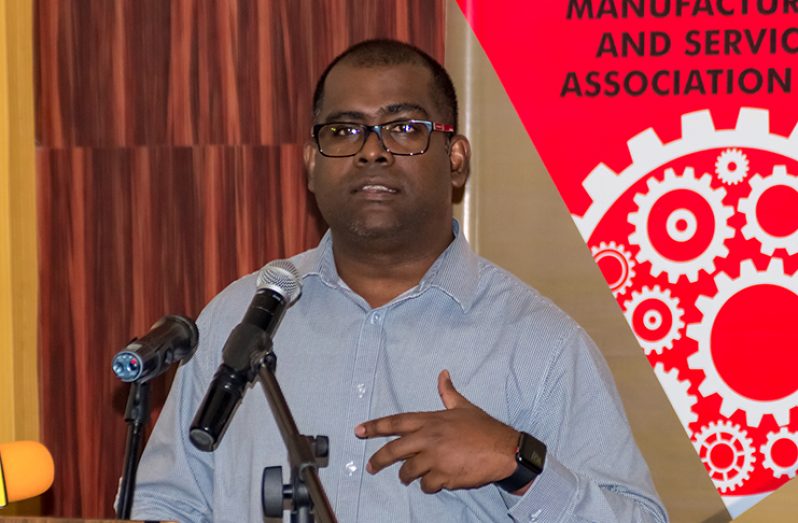– to manage Sovereign Wealth Fund
A BOARD of Directors void of political individuals to manage the country’s Sovereign Wealth Fund (SWF) is being proposed by former Chair of the Private Sector Commission (PSC), Ramesh Persaud.
Persaud, now the Chief Executive Officer (CEO) of Institute of Private Enterprise Development (IPED), presented examples on how this could be achieved during a discussion hosted by the Guyana Manufacturing & Services Association (GMSA) on Thursday.
The discussion was themed, “Managing future petroleum, revenues and the establishment of a fiscal rule and a SWF,” and saw a number of civil society and private sector representatives being invited to make contributions to the debate.
Persaud is in favour of the fund being set up as a separate legal corporate entity by an Act of Parliament, as provided for under the Constitution of Guyana.
He also wants the fund designated as the entity to receive all monies from the oil-and gas sector, and any other natural resources as deemed necessary.
When it comes to ownership, he suggests that the fund be owned by the people of Guyana and governed by their elected representatives in the National Assembly, who will be tasked with performing all duties of a shareholder at Annual General Meetings.
While acknowledging that in many areas, it is difficult to be operational without the involvement of politics, he stated that there are possibilities where this can be achieved to some extent.
As such, Persaud proposes that for the governance of the SWF, that the National Assembly, acting with their right as shareholders, should appoint a Board of Directors. The Board would comprise of seven to nine individuals to avoid political partisanship, and will include representatives from varying areas of expertise and functions in society.
COMPOSITION
Among those persons, he suggests, should be a lawyer who is a Senior Counsel and nominee of the Guyana Bar Association (GBA); an accountant with at least 15 years membership of the Institute of Chartered Accountants of Guyana (ICAG); and an economist with no less than a PhD nominated by the Council of the University of Guyana (UG).
Persaud suggests that the other members of the Board include a representative of a multilateral agency, perhaps nominated by the Caribbean Development Bank (CDB) or Inter-American Development Bank (IDB); the head of a publicly-listed company or a licenced financial institution nominated by the Guyana Securities Council; a member of a global company; a director as nominated by the International Forum on SWF; a representative nominated by an organised labour body; and a representative of the Guyana Human Rights Commission.
Those on the board will be empowered by the elected Chairman of the Board, Persaud stated. He also added that directors should be appointed for no more than three years and director must serve no more than two terms.
The Board would then appoint the professional management of the organisation, but it ought not to be involved in individual investment decisions.
“The Board should be involved in policy making, performance management and ensuring that the right types of people are being appointed at as the CEO and at least at the Executive level,” Persaud outlined.
In addition, although the SWF Green Paper suggests that the Bank of Guyana (BoG) could serve as the Operational Manager of the fund, he is not in favour of this.
“For me, the BoG should be the banker for this organisation, so it has similar responsibilities like it has with commercial banks with regulatory and supervisory responsibility rather than operational management responsibility,” he said, adding that the reporting would be no different than is expected from a publicly listed company.
He stated further that auditors should be nominated by the auditor general every three years through public tender, and submitted for approval to the Annual General Meeting.
At the same time, asset class limits will be done and approved by the Board, based on recommendations from management and other investment specialists.
GOV’T ACCESS
When it comes to access, Persaud suggests that a portion of the Fund be set aside for projects to be undertaken by the government.
However, to utilise this, the government must make a justified proposal for accessing of funds while meeting the same standard of any other investment.
“It is my view that the capital element of the fund should not be used for any consumption purposes,” he said.
“The capital element of the fund should only be used for infrastructure and investments in income-generating activities; this means that we will take all the capital into this fund and the government, with advice through the macroeconomic committee, would determine the annual budget which is approved by Parliament and they will apply for funding from the Sovereign Wealth Fund fulfilling all the feasibility conditions and everything that [the process] required.”
He added that in this case, the Fund’s management will decide on the feasibility of the government’s projects, consistency with investment policy and will be empowered to reject same where necessary.



.jpg)








